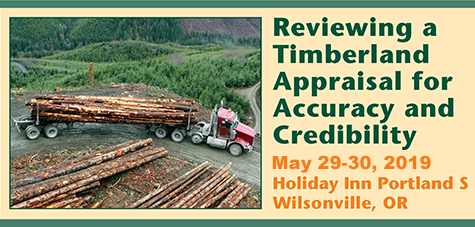Reviewing a Timberland Appraisal for Accuracy and Credibility

Location: Wilsonville, OR
Wednesday – May 29, 2019
1:00 pm Introduction: Course Overview and Objectives
- Welcome
- Facilities
- Introductions – speakers and attendees
- Course Outline
- Handouts/Background Reading
1:20 Overview of Forest Management Concepts & Terminology
- What are the major timber producing regions of the U.S.?
- What are the major timber types within each region?
- Site productivity: the potential of an area to grow trees
- Timber stands: the basic units of management
- Management strategies: even-aged and uneven-aged management
- When to harvest: rotation length & financial vs. biological maturity
- Logging methods for timber harvest: ground vs. cable and types of equipment
- Where do logs go? Timber products, relative values, and their end-use markets
- Land Expectation Value
- Stumpage value
2:00 Drivers of Timberland Value
- Biological factors
- Physical factors
- Location
- Access
- Management history
- Regulatory & environmental issues
- Discount rate
3:00 Break
3:15 Key Concepts & Principals of Valuation
- Market and other types of value
- Elements of market value
- The concept of Highest & Best Use
- Contributory value
- Economic principles underlying valuation
- Appraisal standards
- Scope of work
4:00 The Three Approaches to Value & Their Use in Timberland Appraisal
- Income Capitalization Approach
- Sales Comparison Approach
- Cost Approach
5:00 Adjourn day 1
Thursday – May 30, 2019
8:00 am Application of the Income Approach to Small Properties
- Conversion Return method for merchantable timber
- Valuation pre-merchantable timber
- Contributory value of land
- Sources of data
8:30 Income Approach Exercise
- Split into groups for 60 minute exercise and compare group results for last 30 minutes.
10:00 Break
10:15 Application of the Income Approach to Large Properties
- Modeling discounted cash flow for large properties
- Key factors affecting discounted cash flow valuations
- Projecting log prices
- Determining the market discount rate
- Determining the growth & yield of the forest
- Calculating production & management costs
- Reversion value
11:15 Selection of Sales & Adjustments Under the Sales Comparison Approach
- Sources of sale data
- Selecting “comparable” sales
- Elements & units of comparison
- Sale adjustments and analysis
Noon Lunch (included with registration)
1:00 Sales Comparison Approach Exercise
- Split into groups for 60 minute exercise and compare group results for last 30 minutes.
2:15 Reconciling to a Final Value Opinion
- Strengths and weaknesses of each approach – discussion
- Final reconciliation of the group exercise results
2:45 Break
3:00 Effective Appraisal Review & Interaction with the Appraiser
- How to select the right appraiser
- Providing the right data to the appraiser
- Appraisal review checklist
4:00 Wrap up, Q and A and adjourn
An appraisal review checklist will be provided with the course materials. Use this checklist for a structured and systematic approach to reviewing an appraisal for USPAP compliance as well as evaluating key components of the analysis.
The seminar instructors will provide you with the background and criteria to evaluate appraisals as well as a checklist to ensure a systematic and consistent method for reviewing and providing comments on future appraisals.
Target Audience
- Timberland investment portfolio managers
- Timberland investors
- Financial auditors
- Lenders
- Foresters
The seminar will be held at the Holiday Inn Portland South at 25425 SW 95th Ave. in Wilsonville, OR. The hotel can be reached at: 503-682-2211 or https://hiportlandsouth.com/.
Attendee Laptops:
Attendees are encouraged to bring a laptop with Excel. The session will involve class exercises using Excel.
About the Speakers:
Roger Lord, ACF is the President of Mason, Bruce & Girard and leads the company’s timberland and natural resources valuation services. He has more than 30 years of experience in the areas of timberland appraisal, acquisition and divestiture due diligence, forest economics, and planning.
Roger is a state certified appraiser in Oregon, Washington, and Idaho and specializes in the appraisal of investment grade timberlands throughout the Northwest. In the last five years, the MB&G Appraisal Services Group has completed assignments on 10.8 million acres with an aggregate value of $26 billion.
Roger received a B.S. in Forest Science and M.S. in Forest Resources and Operations Research from Penn State Univ. He is a Member of the Association of Consulting Foresters, member of the Society of American Foresters, and a Practicing Affiliate of the Appraisal Institute.
Zach Dewees is an appraiser in Mason Bruce & Girard’s
Appraisal Services Group. He is a State Certified General Appraiser and an SAF Certified Forester with 14 years of experience in timberland appraisal, forest management and planning, economic analysis, growth and yield modeling, inventory, and GIS. Zach specializes in the appraisal of investment grade timberlands and conservation easements as well as non-industrial timberland and recreational properties. He also focuses on stumpage valuations, acquisition and divestiture due diligence, and timber supply studies. Zach received his B.S. in Forest Management from Washington State University. He is a member of the Society of American Foresters and a Candidate for Designation of the Appraisal Institute.

